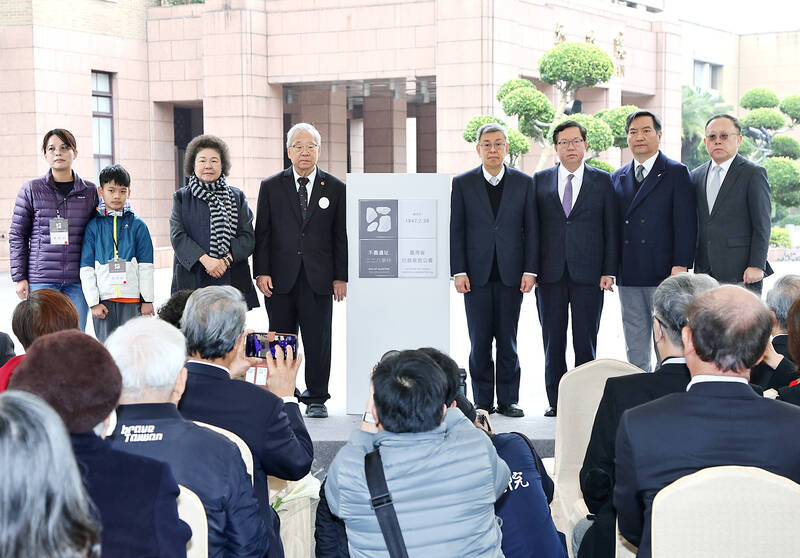Premier Chen Chien-jen (陳建仁) yesterday unveiled a monument at the Executive Yuan in Taipei, officially designating it a “historical site of injustice” to commemorate the victims killed during the 228 Incident of 1947.
The Incident refers to the indiscriminate killing of a person in a crowd on Feb. 27, 1947, and the machine-gunning of a resulting protest at what is now the Executive Yuan by the then-Chinese Nationalist Party (KMT) government the next day. Estimates of the number of eventual deaths vary from 10,000 to more than 30,000.
The Incident was closely followed by the White Terror era in Taiwan.

Photo: CNA
Chen said 42 sites have been identified nationwide where past injustice had taken place and work is under way to preserve them.
“It is time for us to recognize rights abuses and atrocities by past governments. By restoration and facing up to history, we can go on to sustain peace and justice for all,” Chen said.
He said that Article 5 of the Act on Promoting Transitional Justice (促進轉型正義條例) states that “places where the rulers engaged in large-scale human rights abuses during the period of authoritarian rule shall be preserved or rebuilt, and plans shall be made for their designation as historic sites” was the basis for the project.
“In a few days, it is Feb. 28, the day to commemorate what happened at this place. Currently it is the Executive Yuan compound, but 77 years ago in 1947 it was the Taiwan Provincial Administrative Executive Office,” Chen said.
“This was one of several important sites of the 228 Incident. Today, we are unveiling this monument to pay respect to the families of those who lost their lives here. Without their sacrifice and also the efforts of democracy advocates, Taiwanese today would not have freedom, democracy, rule of law and human rights protections,” he said.
Taiwan 228 Care Association director Wang Wen-hong (王文宏) was invited to attend as a guest of honor. Wang’s father, an elected Kaohsiung city councilor, was killed when trying to mediate between local residents and KMT officials during the Incident.
In his address, Wang praised the government’s efforts on transitional justice and expressed the hope that Chen would facilitate work to identify all “historic sites of injustice” relating to the Incident and the White Terror era before the new president takes over on May 20.
Wang also reiterated the demands of familiy members of the victims that the government complete transitional justice by removing the giant bronze statue of Chiang Kai-shek (蔣介石) at the Chiang Kai-shek Memorial Hall in Taipei.
“Taiwan does not need to have a memorial hall to Chiang, the military dictator who was responsible for mass killings and atrocities against the people of Taiwan,” he said.

NATIONAL SECURITY THREAT: An official said that Guan Guan’s comments had gone beyond the threshold of free speech, as she advocated for the destruction of the ROC China-born media influencer Guan Guan’s (關關) residency permit has been revoked for repeatedly posting pro-China content that threatens national security, the National Immigration Agency said yesterday. Guan Guan has said many controversial things in her videos posted to Douyin (抖音), including “the red flag will soon be painted all over Taiwan” and “Taiwan is an inseparable part of China,” while expressing hope for expedited “reunification.” The agency received multiple reports alleging that Guan Guan had advocated for armed reunification last year. After investigating, the agency last month issued a notice requiring her to appear and account for her actions. Guan Guan appeared as required,

A strong cold air mass is expected to arrive tonight, bringing a change in weather and a drop in temperature, the Central Weather Administration (CWA) said. The coldest time would be early on Thursday morning, with temperatures in some areas dipping as low as 8°C, it said. Daytime highs yesterday were 22°C to 24°C in northern and eastern Taiwan, and about 25°C to 28°C in the central and southern regions, it said. However, nighttime lows would dip to about 15°C to 16°C in central and northern Taiwan as well as the northeast, and 17°C to 19°C elsewhere, it said. Tropical Storm Nokaen, currently

‘NATO-PLUS’: ‘Our strategic partners in the Indo-Pacific are facing increasing aggression by the Chinese Communist Party,’ US Representative Rob Wittman said The US House of Representatives on Monday released its version of the Consolidated Appropriations Act, which includes US$1.15 billion to support security cooperation with Taiwan. The omnibus act, covering US$1.2 trillion of spending, allocates US$1 billion for the Taiwan Security Cooperation Initiative, as well as US$150 million for the replacement of defense articles and reimbursement of defense services provided to Taiwan. The fund allocations were based on the US National Defense Authorization Act for fiscal 2026 that was passed by the US Congress last month and authorized up to US$1 billion to the US Defense Security Cooperation Agency in support of the

PAPERS, PLEASE: The gang exploited the high value of the passports, selling them at inflated prices to Chinese buyers, who would treat them as ‘invisibility cloaks’ The Yilan District Court has handed four members of a syndicate prison terms ranging from one year and two months to two years and two months for their involvement in a scheme to purchase Taiwanese passports and resell them abroad at a massive markup. A Chinese human smuggling syndicate purchased Taiwanese passports through local criminal networks, exploiting the passports’ visa-free travel privileges to turn a profit of more than 20 times the original price, the court said. Such criminal organizations enable people to impersonate Taiwanese when entering and exiting Taiwan and other countries, undermining social order and the credibility of the nation’s